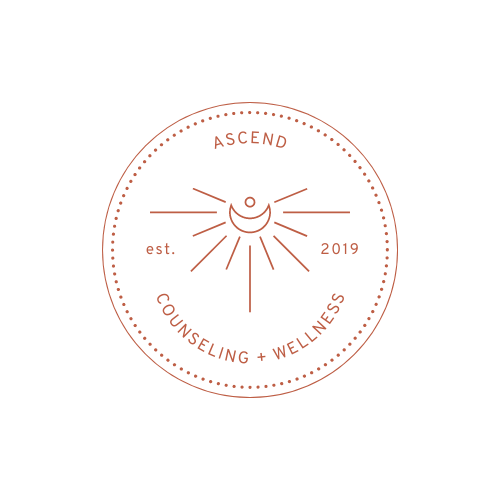Identity-affirming therapy for adults
In-person therapy for clients in Round Rock + surrounding areas
Virtual therapy throughout Texas

Culturally-responsive and inclusive support for LGBTQ+, BI&POC, and fat adults, adult children with difficult parents, helping professionals, and adults living with trauma.
Are we a good fit?
It’s important to tell you who I have the most success helping so that you can quickly decide if we would be a good fit for each other.
The clients who have the most success in therapy with me are those who are curious about who they are and are ready to work toward growth. They understand that change takes time and that therapy is not about “fixing” you (you’re not broken, btw).
They appreciate my warmth and gently direct approach. I won’t tiptoe around a problem, but won’t harshly call it out either. They are looking for someone who understands them not just on an individual level, but also how culture, systems, and history have influenced who they are.
I try to be the type of therapist that I would want to work with.
I am an active participant in your treatment and I am not a “blank slate”. I work to balance gaining an understanding about clients’ experiences with actionable steps to take to manage their emotional health. I have a (usually corny) sense of humor and occasionally say some choice words. I invite clients to do the same.
Many of today’s solutions for people with oppressed identities are one-size-fits-all and derived from white supremacy, leading so many to feel misunderstood and even harmed. I know that your circumstances are unique, so every step we take is culturally responsive and tailored to your life story.

01
Start by scheduling a free 20 minute consultation phone call. During this call, we will briefly get to know each other, answer any questions including logisitics, and determine if we are a good fit to work together. If we decide to move forward, we will schedule your first session during this call.
02
Prior to your first session, you will complete the intake paperwork electronically. This allows you time to review the policies and bring any questions to your first session. Completing the intake packet before the first session will provide time for me to review your intake paperwork.
03
At your first session, I will review the policies and consent form, allowing you to ask any questions you may have. In this session, I will ask you many questions about who you are, what you have experienced, and what you would like to achieve during therapy. Building a trusting, safe, and strong relationship is the most important part of therapy, and the initial session is focused on establishing this relationship.
Therapy for Adult Children with Difficult Parents
If you grew up in an emotionally neglectful environment with difficult parents, therapy can help you process your past experiences and understand how they impact your present relationships. Many clients I work with had to become highly independent at a young age, fending for their own needs before they had the tools to do so. They may have had to take care of their parents emotionally, leaving little space for their own needs and emotional experiences. As adults, this shows up as people pleasing, perfectionism, difficulty setting boundaries, and doubting their own experiences as valid. Through therapy, you can learn how your experiences have affected you and work toward taking up space. You'll start to embrace your wholeness and understand that everyone has needs, including yourself. By exploring your past, you'll be able to let go of survival tools that no longer serve you and lead a more fulfilling life.
Therapy for Helping Professionals
It's important to remember that even as helpers and therapists, we are not immune to our own difficulties and struggles. In fact, the work we do often amplifies those challenges. It can also be challenging to find a therapist in tight-knit communities of clinicians and helpers, especially when there are shared identities and struggles. As a therapist who specializes in helping other therapists and helping professionals, I offer insight and support in a way that is tailored to the unique qualities of the helping industry, with an emphasis on anti-oppression and decolonizing mental health care. I provide a safe and non-judgmental space for you to explore your own personal and professional struggles, while also helping you to develop strategies for self-care and wellness. We work together toward creating a community of support and understanding that promotes your wellness and growth so that you can keep doing the important work of caring for yourself and others.
EMDR and Trauma Therapy
EMDR is a well-researched, structured treatment that uses natural mechanisms in the brain and body to reduce emotional pain that has become stuck and to become more adaptive and less vivid. This therapy can be helpful for a wide range of issues, including PTSD/trauma, anxiety, depression, OCD, chronic pain, addictions, and other distressing life experiences.
One of the most significant benefits of EMDR is that it does not require a person to extensively detail their traumatic experiences in session. This can be a much gentler way of treating trauma than traditional talk therapies. Instead, EMDR relies on a technique called bilateral stimulation, which can include eye movements, tapping, or other forms of sensory input, to help process and integrate difficult memories and experiences.
EMDR works great as a standalone treatment, with additional somatic-based treatments, or an adjunct to talk therapy, depending on a person's individual needs and preferences. With EMDR, I have witnessed many clients experience significant relief from their symptoms and a renewed sense of hope and resilience in their lives. **A full-session consultation is required to determine if a client is a good fit for EMDR therapy.**





